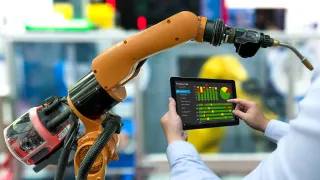As global manufacturing trends shift towards digitalisation and smart factories, Dr. Shuai (Steven) Li assumes a new joint professorship in Technologies for Autonomous Manufacturing at VTT and the University of Oulu. Li’s research focuses on leveraging AI and machine learning to optimize robotic accuracy for greener and more cost-effective solutions. He debunks misconceptions about job loss due to automation and calls for more collaboration between academia, research institutions and industrial stakeholders.
Autonomous manufacturing is a step forward from traditional automation; it aims for a faster increase in productivity and efficiency. According to Professor Shuai Li, the true potential of autonomous manufacturing lies in its ability to streamline and optimize production processes. By harnessing cutting-edge technologies such as artificial intelligence, robotics and machine learning, manufacturers can achieve a level of precision and speed that was previously unimaginable.
“AI is evolving rapidly, transitioning from a weak AI to a strong AI capable of solving a lot of problems that were previously insurmountable.”
At the moment, Li is researching how we can make robotic arms and cranes more accurate without changing the expensive and environmentally heavy hardware itself. With the development AI and machine learning, we’re able to calibrate the structures in a way that significantly increases their precision.
“Using lightweight, traditionally less-accurate structures, and making them more accurate with the help of AI and intelligent software solutions, is more cost-effective and environmentally friendly. This method has vast applicability and holds revolutionary potential across numerous industries,” he explains.
AI brings about new job opportunities
Contrary to the common misconception that automation leads to job losses, Li emphasizes that autonomous manufacturing presents new and exciting career prospects. While automation will take over routine tasks, it also guarantees an increase in competitiveness and job growth. Additionally, it opens up new job opportunities, for example, for professionals in robot programming, artificial intelligence development, and data analytics.
“Robotics allows us to separate humans from the more dangerous and tedious tasks, which will result in safer and more effective manufacturing. So, I’m quite optimistic – this is not a threat, it’s a possibility,” he says.
According to Li, it is essential to focus on upskilling the workforce to equip individuals with the skills required to thrive in the era of autonomous manufacturing. By nurturing talent and fostering a culture of continuous learning, Finland can prepare its workforce for the jobs of the future.

Boosting Finland's industrial competitiveness through collaboration
The joint professorship at VTT and the University of Oulu fosters a collaborative approach to research and innovation. In order to push the boundaries of autonomous manufacturing, it is imperative to establish strong partnerships between academia, research institutions and industrial stakeholders.
“I think that as a research institute VTT has a unique role between academia and industry, as through using future technologies to address real issues, we can demonstrate to companies what is possible and what is the future”, Li explains.
According to Juha Röning, Professor of Embedded Systems at the University of Oulu, this is a crucial time to improve Finland's self-sufficiency and competitiveness through AI solutions. "The importance of automation and robotics has been further emphasized in the current global situation. The COVID-19 pandemic exposed weaknesses in logistic chains, and global polarisation requires bringing manufacturing industries back to Europe," he says.
Finland stands to gain immensely from advancements in autonomous manufacturing. Li envisions Finland as a frontrunner in this domain, with the potential to export its expertise and technologies to the global market. He believes that by pooling academic expertise, industry insights and sufficient governmental support, Finland can position itself as a global hub for autonomous manufacturing research and development.






